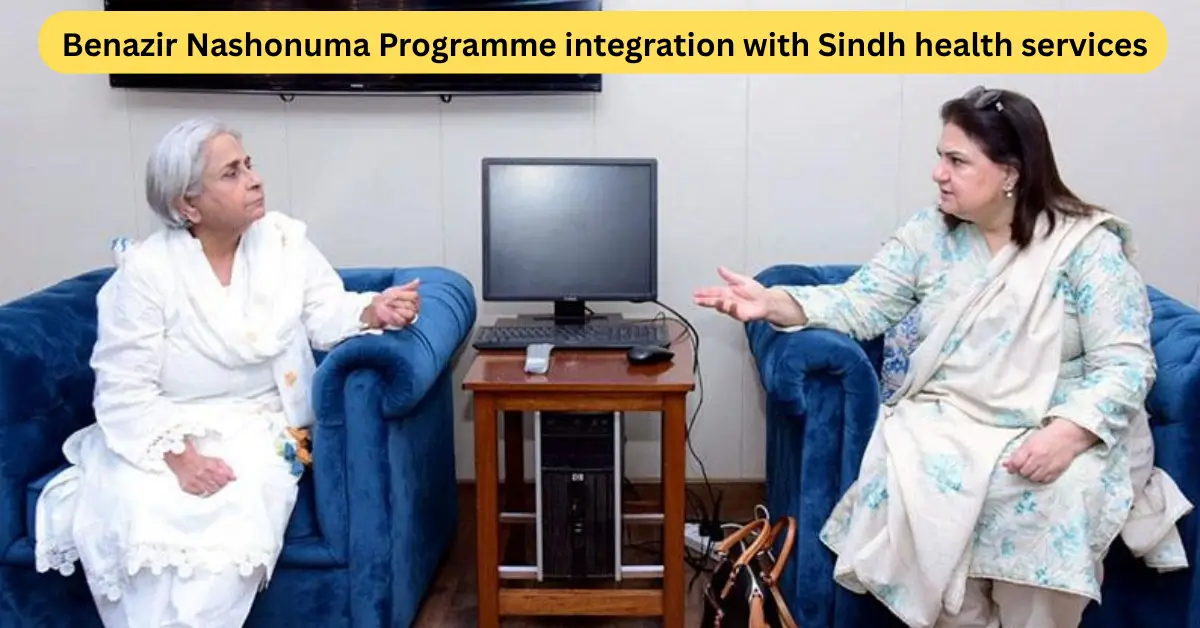Benazir Nashonuma Programme integration with Sindh health services
Benazir Nashonuma Programme integration with Sindh health services: In a major step towards improving maternal and child health in Pakistan, Chairperson of the Benazir Income Support Programme (BISP), Senator Rubina Khalid, met with Sindh Health Minister Dr. Azra Fazal Pechuho to discuss the integration of the Benazir Nashonuma Programme with the Sindh Government’s existing health services.
The high-level meeting highlighted the shared commitment of both federal and provincial leaders to strengthen public health systems, especially for women and children in rural and underserved communities.
Working Together for Better Health Outcomes
The main purpose of the meeting was to explore how the Benazir Nashonuma Programme can work more closely with Sindh’s health initiatives. By combining resources and aligning their efforts, both parties aim to improve maternal and child health, reduce malnutrition, and address key health challenges faced by vulnerable populations.
Special attention was given to:
- Combating anemia among pregnant and lactating women.
- Expanding access to nutritional supplements.
- Enhancing population counseling services to raise awareness about maternal and child health.
Support from Development Partners
During the meeting, Dr. Asim Ijaz, Director General CCT/NSER BISP, shared insights into a new initiative supported by the Gates Foundation. This upcoming program will focus on improving healthcare services for pregnant and lactating women across Pakistan, and will likely complement ongoing efforts under the Benazir Nashonuma Programme.
Pak Saaf O Shafaf Program: KP CM Launches Major Rs11 billion Rural Cleanliness Initiative
Voices of Leadership: Commitment to Public Health
Senator Rubina Khalid emphasized the importance of strengthening coordination between federal and provincial entities. She highlighted how the Benazir Nashonuma Programme is already making a difference by providing conditional cash transfers and specialized nutrition support to pregnant women, lactating mothers, and children under two years of age.
She noted that avoiding duplication of services and improving coordination can lead to better service delivery and broader outreach, especially in hard-to-reach areas.
On the other hand, Dr. Azra Fazal Pechuho reiterated the Sindh Government’s dedication to improving maternal and child health indicators. She stressed the importance of reaching remote communities and engaging with the private sector to create a sustainable and effective healthcare system.

Leveraging the Strength of Social Protection and Health Systems
Both leaders agreed that integrating the Benazir Nashonuma Programme with Sindh’s health infrastructure can ensure a multi-sectoral approach to tackling public health issues. This collaboration can make use of BISP’s vast social protection network and Sindh’s health facilities to provide targeted support where it’s needed the most.
By sharing data, aligning services, and working hand-in-hand, the partnership can bring a lasting impact on the lives of thousands of women and children.
The Way Forward: Public-Private Synergy
An important part of the discussion involved the role of the private sector in improving health service delivery. Both Senator Rubina Khalid and Dr. Azra Pechuho agreed that government efforts alone are not enough. Engaging private partners can help bring in new resources, technologies, and expertise to make health services more accessible and efficient.

